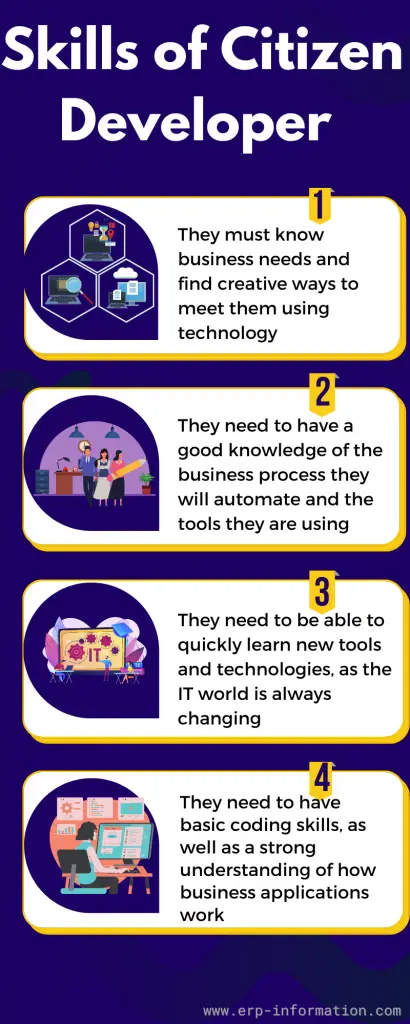
Businesses must keep up as the IT world is changing fast.
It can be challenging for businesses to find the right talent or keep up with the latest technological changes.
As companies attempt to become more agile and efficient, the need for citizen developers has never been greater. With the proper tools and training, anyone can become a citizen developer and make a valuable contribution to their organization.
The article outlines the definition, importance, and skills of the citizen developer and citizen development.
Definition
A citizen developer creates custom applications or modifies existing ones using their skills without the help of a professional developer.
Citizen developers are not typically trained in software development but have the skills and knowledge to create simple applications and systems using readily-available tools such as low-code platforms.
No code development platform: Creating software without code with the help of no-code development platforms (NCDPs). Anyone can create amazing applications through intuitive graphical user interfaces and easy configuration instead of the usual coding.
The platforms like Microsoft PowerApps, UiPath, and ServiceNow help them quickly create custom applications without coding experience. There are many low code tools available in the market. These platforms make it easy for anyone to build custom solutions that solve real-world problems.
Importance
Developers can be precious to organizations because they can quickly and easily solve problems or implement changes that would otherwise be difficult or impossible. They are also cost-effective for getting new applications and features into production. They work hard for the improvement of the operational efficiency of the organization.
Skills
- They must know business needs and find creative ways to meet them using technology.
- They need to have a good knowledge of the business process they will automate and the tools they are using.
- They also need to be able to quickly learn new tools and technologies, as the IT world is constantly changing.
- They need to have basic coding skills and a strong understanding of how business applications work.
Steps to become a citizen developer
Identify the proper position and join
If you want to be a citizen developer in your organization, you first need to show interest. You might be selected if your organization already has an automated process. If they do, they might have a program for employees to participate in. Talk to the person who runs the program and find out how you can join it.
Take the initiative to familiarize yourself with the platform
Find out what software your company uses for no-code. Then, take part in training or read about it. Some companies offer training for citizen developers, so use that chance. You can also watch videos and tutorials on YouTube to learn about it.
Put your effort into experimenting with the platform
Using the citizen development platform, you can try out different ideas and make a new workflow. First, figure out which process you want to automate. Then, list the things that it needs to do in order. Next, make a blueprint of the steps. Finally, use the platform to turn your blueprint into real steps and check if they match what you need them to do.
Find solutions to help business
After your first process is approved by IT, you need to build again. Think about how automation can help your organization. Look for difficult areas and see if automation can make them easier. Try simplifying processes, working well with others, and quickly getting solutions done.
Improve your app development skill
Once you become good at something, you can get even better. To keep improving your skills, build more apps. Try new ideas and create apps for different people, groups, or customers.
Some best practices of the citizen developer
- Keep practice of documenting everything
- Collecting right data
- Practice low code language libraries
- Time sensible and keep learning
- Keep on testing applications
What is Citizen Development?
Citizen development, also known as citizen coding, is inexperienced software developers’ latest process of creating and modifying software applications.
Instead, they use various tools, including online app builders or low code and no code platforms (these platforms provide drag and drop user interface)to create these applications.
Benefits
Decreases burden
Rather than waiting on a professional developer or an IT team, businesses can get the solutions they need in a fraction of the time through citizen development by quickly creating custom applications and processes to solve specific business problems. IT leaders think that using a low code or no code solution will make it faster to create software.
That helps to reduce the burden on the IT department.
Cost saving
In most cases, citizen development is less expensive than traditional software development. That is because these developers are not professionals and don’t require the same level of training or experience.
Improves business agility
Another key benefit of citizen development is that it helps businesses become more agile. These days, businesses need to be able to adapt quickly to changes in the market and respond to customer needs.
Citizen developers can help businesses do this by quickly creating custom applications and processes that can be easily changed or updated as needed.
Enables business innovation
Citizen development also enables businesses to be more innovative. By allowing employees to create custom solutions quickly, businesses can encourage them to develop new ideas and ways to improve their work.
Increases productivity and efficiency
Citizen development can also help businesses increase their productivity and efficiency. By using low code or no code platforms, businesses can enhance the creation and customization of apps and free up employees’ time to focus on more important tasks.
Limits
However, there are some limits to citizen development.
Can lead to Shadow IT
It can lead to what is known as “shadow IT.” It happens when business units create their applications and processes outside the IT department’s control. That can create problems with data quality and security.
Can create technical debt
Technical debt happens when businesses create applications and processes that are not well-designed or well-documented. That can cause problems when businesses need to make changes to these applications.
Low-quality development
Another potential downside of citizen development is that it can lead to low-quality development. That is because citizen developers are not professional developers and may not know writing code or have the same level of training or experience.
They may not be suitable for technically complex projects.
Citizen Developer Tools
Citizen development tools are listed below.
- Microsoft PowerApps
- Mendix
- UiPath Studio
- Salesforce Lightning platform
- Appian Designer
- OutSystems Platform
- Quick Base
- Zoho Creator
- Betty Blocks
FAQs
How to become a citizen developer?
There is no accurate answer to this question, as the skills and experience required to become a citizen developer will vary depending on your specific platform or framework.
However, some tips on becoming a citizen developer include taking online courses, attending meetups and networking events, and reading tutorials and blog posts.
Additionally, it is crucial to be proactive and ask questions of other developers with more experience in the field.
What makes a good citizen developer?
Developers are typically business users with technical knowledge and can translate their business needs into functional applications. However, citizen developers must also be able to quickly learn how to use self-service tools to build custom solutions.
What is an SAP citizen developer?
It is a term used for business users who create or modify simple SAP applications without the help IT professional.
Instead, they use self-service tools like the SAP Fiori Launchpad to build custom SAP applications that meet their specific needs.
What is an RPA citizen developer?
It is a term used for business users who create or modify simple robotic process automation (RPA) applications without the help of an IT professional. Instead, they use readily available tools, such as UiPath Studio, to build custom RPA applications.
Conclusion
Citizen Developers are the future of IT. They are people who use self-service tools to create and modify custom applications for their business or organization.
Their jobs are rising as companies seek more efficient and cost-effective ways to get things done. Moreover, they have a unique set of skills that allow them to thrive in this new era of IT.
Citizen development is used for business users who create or modify simple applications without the help of a software developer or IT professional.
Citizen development has many benefits, enabling businesses to be more agile, innovative, productive, and efficient.
However, there are some potential downsides, such as the risk of Shadow IT and low-quality development. Many resources are available to become a citizen developer.
We hope this article has helped you know the concept thoroughly.
